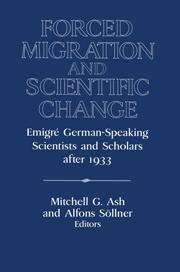Book contents
- Frontmatter
- Introduction: Forced Migration and Scientific Change after 1933
- PART ONE PHYSICAL AND MEDICAL SCIENCES
- PART TWO PSYCHOLOGY, PSYCHONALYSIS, PEDAGOGY
- PART THREE SOCIAL SCIENCES
- 8 Dismissal and Emigration of German-Speaking Economists after 1933
- 9 Emigration of Social Scientists' Schools from Austria
- 10 The Vienna Circle in the United States and Empirical Research Methods in Sociology
- 11 From Public Law to Political Science? The Emigration of German Scholars after 1933 and Their Influence on the Transformation of a Discipline
- Epilogue: The Refugee Scholar in America: The Case of Paul Tillich
- Index
10 - The Vienna Circle in the United States and Empirical Research Methods in Sociology
Published online by Cambridge University Press: 05 January 2013
- Frontmatter
- Introduction: Forced Migration and Scientific Change after 1933
- PART ONE PHYSICAL AND MEDICAL SCIENCES
- PART TWO PSYCHOLOGY, PSYCHONALYSIS, PEDAGOGY
- PART THREE SOCIAL SCIENCES
- 8 Dismissal and Emigration of German-Speaking Economists after 1933
- 9 Emigration of Social Scientists' Schools from Austria
- 10 The Vienna Circle in the United States and Empirical Research Methods in Sociology
- 11 From Public Law to Political Science? The Emigration of German Scholars after 1933 and Their Influence on the Transformation of a Discipline
- Epilogue: The Refugee Scholar in America: The Case of Paul Tillich
- Index
Summary
It is well known that most of the logical positivists of the Vienna Circle emigrated to America in the 1930s or 1940s, and there became academically prominent and intellectually influential. The general trend of American sociology between 1930 and 1960 is typically seen as positivistic, and it is common to connect these two points and to suggest that developments in sociology were influenced or caused by the migration of the Vienna Circle and the dominance of their ideas. The nature of the proposed connection varies, and some scholars, such as Christopher G.A. Bryant, see the influence as only minor. These ideas, however, are not normally grounded in any systematic, detailed research of the actual connections and influence of empirical sociology. This chapter aims, in contrast, to look more closely at what actually happened. In doing so, it will inevitably raise some general methodological questions with regard to tracing influence.
Who should be counted as a member of the Vienna Circle? Some scholars have included thinkers such as Ludwig Wittgenstein and Karl Popper, who were in Vienna at the same time and who had contacts with members of the Circle, although they were not actually members. We have excluded them from this study. Another potential group is those who were never based in Vienna but who kept in close touch with the Circle and regarded themselves as part of the same movement. The people around Hans Reichenbach and the Society for Scientific Philosophy in Berlin, for example, make one such group, and pragmatically will be counted as belonging to the Circle. Reports indicate, however, that Felix Kaufmann, who attended meetings of the Circle, did not regard himself as a member because his intellectual position differed, and thus he will be treated as marginal.
- Type
- Chapter
- Information
- Forced Migration and Scientific ChangeEmigré German-Speaking Scientists and Scholars after 1933, pp. 224 - 245Publisher: Cambridge University PressPrint publication year: 1996



